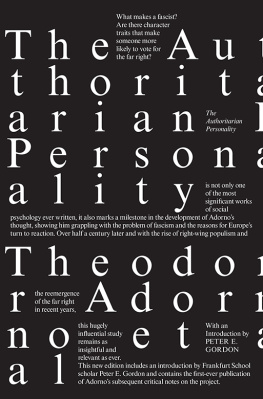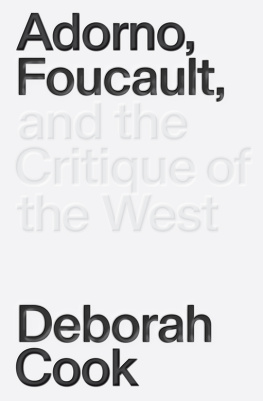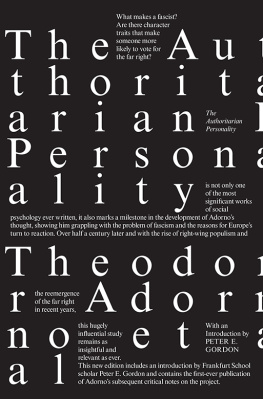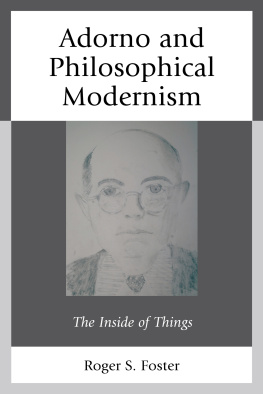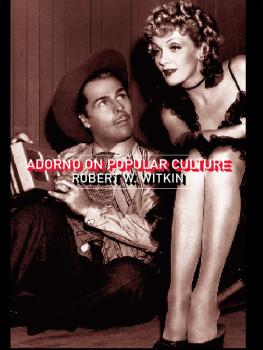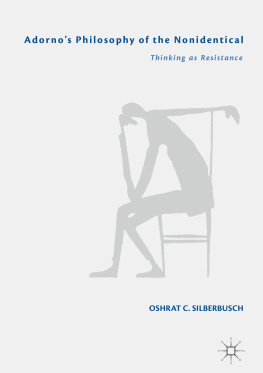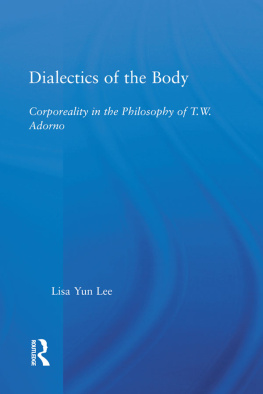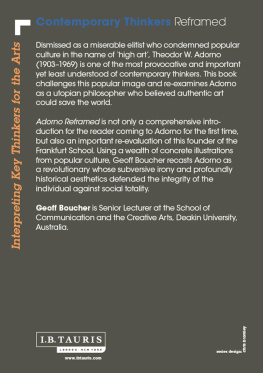T. W. Adorno - The Authoritarian Personality
Here you can read online T. W. Adorno - The Authoritarian Personality full text of the book (entire story) in english for free. Download pdf and epub, get meaning, cover and reviews about this ebook. year: 0, publisher: Verso, genre: Politics. Description of the work, (preface) as well as reviews are available. Best literature library LitArk.com created for fans of good reading and offers a wide selection of genres:
Romance novel
Science fiction
Adventure
Detective
Science
History
Home and family
Prose
Art
Politics
Computer
Non-fiction
Religion
Business
Children
Humor
Choose a favorite category and find really read worthwhile books. Enjoy immersion in the world of imagination, feel the emotions of the characters or learn something new for yourself, make an fascinating discovery.
- Book:The Authoritarian Personality
- Author:
- Publisher:Verso
- Genre:
- Year:0
- Rating:3 / 5
- Favourites:Add to favourites
- Your mark:
- 60
- 1
- 2
- 3
- 4
- 5
The Authoritarian Personality: summary, description and annotation
We offer to read an annotation, description, summary or preface (depends on what the author of the book "The Authoritarian Personality" wrote himself). If you haven't found the necessary information about the book — write in the comments, we will try to find it.
The Authoritarian Personality — read online for free the complete book (whole text) full work
Below is the text of the book, divided by pages. System saving the place of the last page read, allows you to conveniently read the book "The Authoritarian Personality" online for free, without having to search again every time where you left off. Put a bookmark, and you can go to the page where you finished reading at any time.
Font size:
Interval:
Bookmark:

Personality
by
T. W. Adorno
Else Frenkel-Brunswik
Daniel J. Levinson
R. Nevitt Sanford
in collaboration with
Betty Aron, Maria Hertz Levinson
and William Morrow
with a new introduction by
Peter E. Gordon

This edition published by Verso 2019
First published by Harper & Row, Inc. 1950
The American Jewish Committee 1950, 2019
Introduction Peter E. Gordon 2019
All rights reserved
The moral rights of the authors have been asserted
1 3 5 7 9 10 8 6 4 2
Verso
UK: 6 Meard Street, London W1F 0EG
US: 20 Jay Street, Suite 1010, Brooklyn, NY 11201
versobooks.com
Verso is the imprint of New Left Books
ISBN-13: 978-1-78873-164-5
ISBN-13: 978-1-78873-166-9 (UK EBK)
ISBN-13: 978-1-78873-165-2 (US EBK)
British Library Cataloguing in Publication Data
A catalogue record for this book is available from the British Library
Library of Congress Cataloging-in-Publication Data
A catalog record for this book is available from the Library of Congress
Printed and bound by CPI Group (UK) Ltd, Croydon CR0 4YY
PART I
THE MEASUREMENT OF IDEOLOGICAL TRENDS
PART II
PERSONALITY AS REVEALED THROUGH CLINICAL INTERVIEWS
PART III
PERSONALITY AS REVEALED THROUGH PROJECTIVE MATERIAL
PART IV
QUALITATIVE STUDIES OF IDEOLOGY
PART V
APPLICATIONS TO INDIVIDUALS AND TO SPECIAL GROUPS
TABLES AND FIGURES
|
Ethnocentrism Scale |
Ethnocentrism Scale |
Ethnocentrism Scale |
The Total Ethnocentrism Scale |
INTRODUCTION TO
THE AUTHORITARIAN PERSONALITY
Originally published in 1950, The Authoritarian Personality remains a major landmark in political psychology. It represents one of the most sophisticated attempts to explore the origins of fascism not merely as a political phenomenon, but as the manifestation of dispositions that lie at the very core of the modern psyche. For this reason alone, it merits our attentionespecially today, when insurgent fascist or quasi-fascist political movements seem once again to threaten democracies across Europe and the Americas. The relevance of this effort for our contemporary moment may strike the reader as self-evident. But the details of the original study are still poorly understood, not least because terms such as fascism or authoritarianism have an expressive function that can overwhelm careful analysis. After all, to condemn something as fascist is both a cry of alarm and a palliative: it names a political extreme even while it offers the consoling thought that the extreme is not the norm. It was among the major achievements of the original Authoritarian Personality study that it challenged this liberal assumption, by showing that the potential for fascism lie not at the periphery but at the very heart of modern experience. It set out to demonstrate that fascism is something far deeper than a political form: it correlates with psychological patterns of domination and submission that take shape in earliest childhood and later harden into a syndrome of attitudes regarding hierarchy, power, sexuality, and tradition. The psyche of a fascist is authoritarian in the sense that it attaches itself to figures of strength and disdains those it deems weak. It tends toward conventionalism, rigidity, and stereotypical thinking; it insists on a stark contrast between in-group and out-group, and it jealously patrols the boundaries between them. It is prone to obsession over rumors of immorality and conspiracy, and it represses with self-loathing the sexual licentiousness it projects onto others. In all of these ways, fascism appears as the political manifestation of a pre-political disposition. The authoritarian personality does not always turn explicitly fascist; its politics may remain dormant, only to emerge under certain social-historical conditions. This thesis offers an important corrective to those who prefer to see fascism as discontinuous with liberal-democratic political culture: fascism is not mysterious, and it is not something otherworldly or rare; it is the modern symptom of a psychopathology that is astonishingly widespread and threatens modern society from within.
In his original preface to the book, Max Horkheimer, the director of the Institute for Social Research, wrote that the study had succeeded in identifying nothing less than a new anthropological species. Unlike the traditional bigot, the authoritarian type united in a single personality the characteristics of a highly industrialized society with irrational or anti-rational beliefs. He was at the same time enlightened and superstitious, proud to be an individualist and in constant fear of not being like the others, jealous of his independence and inclined to submit blindly to power and authority. The explanatory tools that were required for such a task were formidable. Eschewing the narrow constraints and distinctions of academic disciplines, the Authoritarian Personality study united into a single project a broad array of research methods, joining sociology with psychoanalysis, empirical quantitative analysis and qualitative interviews with the most abstract considerations in social theory and philosophy.
For such a project it was natural to convene a team of researchers who possessed an uncommon array of disciplinary skills. As the official representative of the Institute for Social Research, or Frankfurt School, Theodor W. Adorno (19031969) brought to the study a notably European spirita deep, if deeply critical and ambivalent, interest in psychoanalytic theory, together with a sensitivity to philosophical and sociological questions that did not always harmonize well with the more empirical and psychological orientation of his American colleagues. Like Adorno, Else Frenkel-Brunswik (19081958) was also a refugee from Nazi Europe. Trained in Vienna as a psychologist, she had fled Austria for the United States in 1938 and assumed a post in the department of psychology at the University of California, Berkeley. Her crucial contribution to the study is most evident in the qualitative-interview chapters and the theoretical sections on parenting, child development, and sexuality. The four coauthors also benefited from the assistance of several researchers, who contributed to the theoretical development of the project and helped in the interviews as well as the collection and analysis of the data.
The research for such a project was enormous and would not have been possible without the financial support provided by the American Jewish Committee, an organization for mutual aid among Jewish immigrants to America, originally founded in 1906 in the aftermath of Europes most violent pogroms.
It should be obvious that the study of fascism and anti-Semitism was not unrelated to the personal biographies of the institute, nearly all of whom were of Jewish descent and whose careers were interrupted by the emergence of Nazism in Europe. Fascism was not only a topic of research; it was also an existential threat. But facts of personal identity can hardly account for the intellectual and political significance of this research. After all, fascisms
Font size:
Interval:
Bookmark:
Similar books «The Authoritarian Personality»
Look at similar books to The Authoritarian Personality. We have selected literature similar in name and meaning in the hope of providing readers with more options to find new, interesting, not yet read works.
Discussion, reviews of the book The Authoritarian Personality and just readers' own opinions. Leave your comments, write what you think about the work, its meaning or the main characters. Specify what exactly you liked and what you didn't like, and why you think so.

